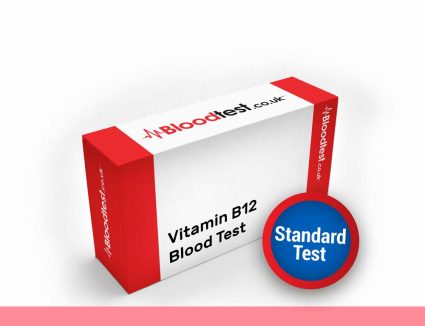Discover How Vitamin B12 Deficiency Can Negatively Affect Your Health and Well-being
Exploring the Essential Role of Vitamin B12 in Human Health and Function

The Vitamin B12 Blood Test in Swindon is an essential diagnostic tool that assesses Vitamin B12 levels, which is scientifically known as cobalamin. This essential nutrient plays a pivotal role in numerous bodily functions, notably in maintaining healthy nerve cells and facilitating the production of robust red blood cells. It is crucial to sustain adequate Vitamin B12 levels to prevent anaemia, and it significantly contributes to the intricate processes involved in DNA synthesis, while also supporting optimal functioning of the brain and nervous system. A lack of sufficient Vitamin B12 can greatly hinder the body's ability to produce an adequate quantity of healthy red blood cells, resulting in debilitating symptoms such as fatigue, weakness, and various neurological issues that can profoundly diminish one's quality of life.
With a growing awareness surrounding dietary deficiencies, recognising the indispensable role of Vitamin B12 has become increasingly important, especially for those who may be at risk of deficiency. As the human body cannot synthesise this vitamin naturally, it is necessary to acquire it from dietary sources or supplements. Accordingly, individuals should prioritise regular testing, such as the Vitamin B12 blood test in Swindon, to effectively monitor their levels and ensure that their health remains optimal.
Recognising the Key Symptoms Linked to Vitamin B12 Deficiency
Being able to recognise the diverse symptoms associated with Vitamin B12 deficiency is vital for facilitating timely intervention and treatment. Common signs include fatigue and weakness, which are often mistakenly attributed to the natural ageing process or stress. Additionally, various neurological symptoms may arise, including numbness or tingling sensations in the extremities, difficulties with balance, and cognitive disturbances such as memory loss and confusion that can disrupt everyday activities.
The intensity and severity of these symptoms can differ significantly among individuals. While some may experience a gradual onset of symptoms, others may encounter sudden and severe manifestations of deficiency. It is particularly crucial for those in high-risk groups, including the elderly and strict vegans, to remain vigilant, as their natural dietary sources of Vitamin B12 may be inadequate.
Having a comprehensive understanding of the symptoms associated with Vitamin B12 deficiency empowers individuals to seek prompt medical assistance and necessary diagnostic testing, such as the Vitamin B12 blood test in Swindon. Early detection is essential for improving overall health outcomes and significantly enhancing one’s quality of life.
Are You Prepared to Prioritise Your Health and Wellness?
 Identifying Populations More Susceptible to Vitamin B12 Deficiency
Identifying Populations More Susceptible to Vitamin B12 Deficiency
Various demographic groups demonstrate a heightened vulnerability to developing Vitamin B12 deficiency. Vegans and vegetarians, who avoid animal-derived products, may struggle to maintain adequate levels of this vital nutrient, highlighting the necessity of incorporating fortified foods or dietary supplements into their eating habits. Furthermore, older adults are particularly at risk due to age-related changes in gastrointestinal function, which can hinder nutrient absorption.
Additionally, individuals with gastrointestinal disorders, such as Crohn’s disease or coeliac disease, may face significant challenges regarding nutrient absorption, further increasing their likelihood of deficiencies. Certain medications, including metformin for diabetes management and proton pump inhibitors for acid reflux treatment, can negatively impact Vitamin B12 levels. Awareness of these risk factors is crucial for making informed dietary choices and considering necessary testing, such as the Vitamin B12 blood test in Swindon.
Uncovering the Root Causes of Vitamin B12 Deficiency

The causes of Vitamin B12 deficiency can be intricate, primarily arising from inadequate dietary intake, malabsorption issues, or the adverse effects of specific medications. For individuals adhering to a vegan or vegetarian diet, the absence of fortified foods or appropriate supplements may lead to a deficiency that poses serious health risks.
Malabsorption conditions, such as pernicious anaemia, significantly impair the body’s capacity to absorb Vitamin B12, resulting in a slow yet substantial deficiency over time. Furthermore, certain medications that alter stomach acidity can obstruct absorption, making it essential to regularly monitor levels to prevent complications.
Genetic factors may also contribute to deficiency, as some individuals might inherit conditions that disrupt Vitamin B12 metabolism. A comprehensive understanding of these causes is vital for determining the appropriate response, which may involve dietary adjustments, supplementation, or more intensive medical interventions. This underscores the necessity of routine blood testing, such as the Vitamin B12 blood test in Swindon, to effectively monitor health status.
Comprehensive Diagnosis of Vitamin B12 Deficiency: Testing Techniques and Protocols
Diagnosing Vitamin B12 deficiency typically requires a blood test that evaluates serum B12 levels alongside methylmalonic acid (MMA) concentrations. The serum B12 test assesses whether sufficient amounts of the vitamin are present in the bloodstream, while elevated MMA levels may suggest a deficiency, even when serum B12 levels appear normal.
For individuals presenting symptoms or those belonging to high-risk categories, seeking testing is of utmost importance. Regular health examinations can facilitate early detection, allowing timely interventions that prevent severe health complications. In Swindon, healthcare professionals can provide essential guidance on the most effective measures, potentially recommending a Vitamin B12 blood test to evaluate levels and determine if dietary modifications or supplementation are necessary.
The reliability of these tests is critical for effective health management, underscoring the importance of consulting with healthcare providers who possess comprehensive knowledge regarding the complexities of B12 deficiency and its potential implications. Gaining insights from test results can pave the way for tailored treatment plans that ensure optimal health outcomes.
Highlighting the Essential Need for Regular Vitamin B12 Testing
Recognising the Importance of Consistent Testing for Vitamin B12 Levels

Conducting regular tests for Vitamin B12 levels is fundamental for the early detection of deficiencies, which can prevent serious health complications such as anaemia and nerve damage. Many individuals remain unaware of their deficiency until they exhibit noticeable symptoms, rendering routine testing a crucial element of healthcare, especially for those in high-risk categories.
Timely detection allows for immediate intervention, which can significantly enhance one's quality of life. For instance, a straightforward blood test can reveal deficiencies that, if overlooked, could lead to irreversible neurological damage. In the UK, healthcare professionals advocate for testing among individuals displaying symptoms or belonging to higher-risk populations, emphasising the proactive approach to health management that routine testing encourages.
For residents of Swindon, being informed about available testing options is imperative. The Vitamin B12 blood test in Swindon serves not only as a diagnostic measure but also empowers individuals to take charge of their health. With the right information, patients can make educated decisions regarding their health and treatment options.
Determining When to Have Your Vitamin B12 Levels Tested
Understanding the optimal timing for testing is crucial to effectively manage Vitamin B12 levels. Individuals experiencing symptoms such as fatigue, weakness, or neurological disturbances should promptly seek testing. Additionally, high-risk groups—including vegetarians, vegans, and older adults—should consider integrating regular testing into their health maintenance routines.
The NHS recommends testing at least every two to five years for seniors and those with gastrointestinal disorders, ensuring that any deficiencies are identified before they escalate into serious health concerns. Consistent monitoring provides reassurance and facilitates timely intervention, thereby preventing complications related to untreated deficiencies.
Local healthcare professionals in Swindon can assist in determining the most suitable testing schedule, particularly for at-risk individuals. The Vitamin B12 blood test in Swindon can be a crucial component of a comprehensive health assessment, enabling individuals to stay informed about their nutritional status.
Interpreting Your Vitamin B12 Test Results with Assurance
Grasping the outcomes of a Vitamin B12 test is essential for effective health management. Normal serum B12 levels generally range from 200 to 900 pg/ml; however, interpretations may vary based on individual health conditions and presenting symptoms.
If test results indicate a deficiency, it is crucial to discuss these findings with a healthcare professional to identify underlying causes and appropriate treatment strategies. Elevated levels of methylmalonic acid, even when serum B12 levels appear normal, can indicate a functional deficiency, necessitating timely intervention.
Patients should actively engage in discussions regarding their results and potential subsequent steps with their healthcare provider. The Vitamin B12 blood test in Swindon can provide valuable insights into one’s health status, empowering individuals to make informed decisions concerning their nutrition and supplementation approaches.
Exploring the Range of Tests Available for Assessing Vitamin B12 Levels
Various testing methods are available for evaluating Vitamin B12 levels and overall health status. The most commonly utilised test is the serum B12 test; however, comprehensive evaluations often include additional tests such as methylmalonic acid (MMA) and homocysteine levels.
MMA testing is particularly valuable, as elevated MMA levels may suggest a deficiency even when serum B12 levels seem normal. A thorough testing approach provides a more holistic perspective of an individual’s nutritional status and can inform treatment strategies more effectively.
For residents of Swindon, local clinics and NHS services frequently offer these tests, ensuring accessibility for those seeking clarity regarding their health. The Vitamin B12 blood test in Swindon represents an invaluable first step in understanding one’s nutritional needs and developing a health plan that promotes overall well-being.
Locating Trustworthy Vitamin B12 Testing Services in Swindon
Local Clinics Providing Essential Testing Services for Residents
Swindon is home to various clinics that offer Vitamin B12 testing, delivering vital health services to the local community. Many of these clinics require a referral from a General Practitioner (GP), who can assess symptoms and recommend testing as part of a comprehensive health evaluation.
Local clinics typically provide a wide range of services, from basic blood tests to extensive health assessments, ensuring that individuals receive comprehensive and tailored care. Seeking testing through a GP not only streamlines access to the Vitamin B12 blood test in Swindon but also ensures that results are interpreted within the broader context of the patient’s health.
For residents, exploring different clinic options can expedite timely testing, particularly for those experiencing symptoms or belonging to high-risk groups. By prioritising their health and seeking guidance from healthcare professionals, individuals can take proactive measures towards improved health management.
Private Testing Solutions for Enhanced Convenience and Accessibility
For individuals seeking faster or more convenient testing solutions, private laboratories in Swindon offer Vitamin B12 blood tests without the need for a referral. Private testing options can be particularly appealing for those who prefer to manage their health independently or have concerns regarding wait times associated with NHS services.
These private facilities often provide a variety of health screening services, enabling individuals to address multiple health concerns in one visit. Choosing private testing allows for greater flexibility in scheduling and may even yield same-day results in some cases, allowing individuals to receive timely updates on their health status.
Opting for a private option for the Vitamin B12 blood test in Swindon can be an effective way to stay informed about nutritional levels and overall health, particularly for those requiring immediate answers or follow-up care.
NHS Services Delivering Accessible Vitamin B12 Testing
The National Health Service (NHS) provides essential health services, including Vitamin B12 testing, through local GP practices. Residents in Swindon can access testing as part of routine health evaluations or when they exhibit symptoms indicative of a deficiency.
NHS services are structured to ensure that individuals can obtain necessary diagnostic tests without incurring significant expenses. The referral process allows GPs to assess each patient’s unique needs, ensuring that suitable measures are taken to address potential deficiencies and optimise health.
For those concerned about healthcare costs, understanding how the NHS facilitates access to the Vitamin B12 blood test in Swindon is essential. Regular check-ups and screenings can significantly enhance early detection and prevention of health complications associated with Vitamin B12 deficiency.
Preparing Effectively for Your Vitamin B12 Test: Key Steps to Follow
Crucial Preparations to Ensure Accurate Testing Results
Proper preparation for a Vitamin B12 blood test is essential to guarantee the accuracy of results. In many cases, fasting may be required for a specified duration prior to the test. Patients should confirm specific instructions with their healthcare provider, especially if they are taking medications that may interfere with test results.
Certain medications, including specific antacids and diuretics, can affect Vitamin B12 levels, necessitating a temporary cessation of their use before testing. It is critical to maintain a detailed record of any supplements or medications taken prior to the test, as these can significantly influence the interpretation of results.
Being adequately prepared also includes ensuring all necessary documentation is in place, such as a referral from a GP if required. Understanding what to expect during the testing process can help alleviate anxiety and promote a smoother experience, particularly when arranging a Vitamin B12 blood test in Swindon.
The Testing Process: What You Can Expect
The procedure for obtaining a Vitamin B12 blood test is relatively straightforward and typically involves a simple blood draw. The sample is usually collected from a vein in the arm, and the entire process often takes just a few minutes.
Patients can expect a brief sensation of discomfort during the needle insertion; however, the procedure is generally well-tolerated. Healthcare professionals are trained to create a comfortable environment, addressing any concerns or questions that patients may have prior to the test.
Recognising that the Vitamin B12 blood test in Swindon is a routine procedure can help diminish apprehension. After the blood draw, individuals can typically resume their normal activities without delay, making the testing process both efficient and accessible.
Post-Test Procedures and Follow-Up Recommendations
After a Vitamin B12 blood test, patients may need to schedule a follow-up appointment to discuss their results with their healthcare provider. Understanding the significance of the results and determining subsequent steps is vital for effective health management.
If results indicate a deficiency, healthcare providers will usually recommend a personalised treatment plan, which may involve dietary modifications, supplements, or injections, depending on the severity of the deficiency. This follow-up is crucial for monitoring progress and ensuring the effectiveness of the treatment strategy.
For individuals in Swindon, utilising the Vitamin B12 blood test as a tool for ongoing health monitoring can empower them to take control of their nutritional status and overall wellness. Regular follow-ups are essential for successful health management, as they help ensure that Vitamin B12 levels remain within a healthy range.
Post-Testing: Essential Next Steps for Effective Health Management
Understanding Your Vitamin B12 Test Results
Interpreting the results of a Vitamin B12 blood test is crucial for understanding one's health status. Serum B12 levels are typically classified as normal, borderline, or deficient, with interpretations varying based on individual health conditions.
For those with borderline or low levels, healthcare providers may recommend further testing or immediate interventions to prevent progression to a full deficiency. Grasping these results empowers patients to take proactive steps to address their nutritional needs.
Engaging in discussions with a healthcare professional regarding results is essential for contextualising findings within the broader scope of individual health. The Vitamin B12 blood test in Swindon can lead to a more extensive dialogue about health, nutrition, and lifestyle choices necessary for optimal well-being.
Exploring Treatment Options for Vitamin B12 Deficiency
Upon receiving a diagnosis of Vitamin B12 deficiency, several treatment pathways are available. Dietary modifications may serve as the initial course of action, particularly for individuals whose deficiency arises from inadequate intake. Incorporating more animal products or fortified foods into the diet can help restore adequate levels.
In more severe cases of deficiency, healthcare providers may recommend Vitamin B12 supplements or injections to rapidly replenish vitamin levels. The choice of treatment will depend on individual circumstances, including the severity of the deficiency and its underlying causes.
Monitoring the effectiveness of treatment through follow-up blood tests is critical to ensure that levels normalise. Being aware of treatment options and responding to changes in health status enables individuals to effectively manage their Vitamin B12 levels, particularly with resources like the Vitamin B12 blood test in Swindon.
Ensuring Continuous Monitoring and Follow-Up Care
Regular monitoring of Vitamin B12 levels is essential to ensure that individuals maintain adequate levels following treatment. Follow-up appointments should be scheduled according to the healthcare provider’s recommendations, especially for those with a history of deficiency.
Frequent testing allows for adjustments to treatment plans, ensuring that individuals receive appropriate care over time. This proactive approach to health can help avert potential complications associated with Vitamin B12 deficiency, such as neurological damage or severe anaemia.
For residents of Swindon, continued access to the Vitamin B12 blood test can play a fundamental role in health management, empowering individuals to take control of their nutritional status and overall health outcomes.
Incorporating Lifestyle and Dietary Strategies for Optimal Vitamin B12 Levels
Identifying Nutritional Sources Rich in Vitamin B12
Vitamin B12 is primarily found in animal products, making it essential for individuals following a vegan or vegetarian diet to actively seek alternative sources. Nutrient-dense dietary sources of Vitamin B12 include meat, dairy products, eggs, and fish, all of which provide natural B12 that is crucial for maintaining optimal health.
For those avoiding animal products, fortified foods such as cereals, plant-based milks, and dietary supplements can effectively bridge the nutritional gap. Being well-informed about these sources is vital for ensuring adequate intake, particularly among individuals in high-risk populations.
Incorporating a diverse array of B12-rich foods into one’s diet can enhance overall health. This approach not only addresses potential deficiencies but also supports a balanced nutritional intake, making regular testing, such as the Vitamin B12 blood test in Swindon, essential for tracking levels.
The Importance of Supplements and Fortified Foods in Health Maintenance
For individuals who find it challenging to obtain sufficient Vitamin B12 from diet alone, supplements and fortified foods provide a practical solution. Vitamin B12 supplements come in various forms, including tablets, sublingual tablets, and injections, catering to diverse preferences and health needs.
Fortified foods are particularly beneficial for vegans and vegetarians, providing a convenient means of ensuring adequate intake. Products such as fortified cereals, nutritional yeast, and plant-based milk can significantly contribute to daily B12 requirements.
Integrating these options into dietary routines allows individuals to maintain healthy B12 levels, minimising the potential risks associated with deficiencies. Ensuring accessibility to the Vitamin B12 blood test in Swindon empowers individuals to evaluate the effectiveness of their dietary modifications and supplementation efforts.
Evaluating Lifestyle Factors That Affect Vitamin B12 Levels
Lifestyle choices, particularly alcohol consumption and smoking, can significantly influence the absorption of Vitamin B12 in the body. Excessive alcohol intake can damage the gastrointestinal lining, consequently diminishing the ability to absorb nutrients, while smoking has been linked to lower B12 levels.
Addressing these lifestyle factors is essential for effectively managing Vitamin B12 levels. Promoting healthier habits can enhance nutritional absorption and contribute positively to overall well-being.
Regular testing, such as the Vitamin B12 blood test in Swindon, can provide insights into how lifestyle choices impact vitamin B12 levels. Adopting a holistic approach to health, inclusive of dietary adjustments, lifestyle modifications, and ongoing monitoring, is vital for maintaining optimal well-being.
Addressing Frequently Asked Questions Regarding Vitamin B12
What Does a Vitamin B12 Blood Test Measure?
A Vitamin B12 blood test quantifies the concentration of Vitamin B12 in the bloodstream to determine if an individual is experiencing a deficiency, which can lead to various health complications.
How Can I Identify If I Am Vitamin B12 Deficient?
Common symptoms of Vitamin B12 deficiency include fatigue, weakness, numbness or tingling in the extremities, as well as cognitive disturbances such as confusion or memory issues.
Who Should Consider Testing for Vitamin B12 Deficiency?
Individuals at heightened risk, such as older adults, vegans, vegetarians, and those with gastrointestinal disorders, should contemplate regular testing to monitor their Vitamin B12 levels.
What Is Involved in the Procedure for the Vitamin B12 Blood Test?
The test entails a straightforward blood draw, typically performed from a vein in the arm, and is usually completed within just a few minutes.
What Do the Results of the Vitamin B12 Test Indicate?
Results indicate whether your Vitamin B12 levels are classified as normal, borderline, or deficient, guiding any necessary dietary modifications or treatments.
What Treatment Options Are Available for Vitamin B12 Deficiency?
Treatment strategies may include dietary changes, oral supplements, or Vitamin B12 injections, depending on the severity of the deficiency.
How Frequently Should I Undergo Testing for Vitamin B12 Levels?
It is generally recommended that older adults and those at risk undergo testing every two to five years, or more frequently if symptoms arise.
Can I Obtain Vitamin B12 from Plant-Based Sources?
While natural plant sources of Vitamin B12 are limited, fortified foods such as cereals and plant-based milks can provide individuals following vegan or vegetarian diets with adequate Vitamin B12 intake.
Is Vitamin B12 Deficiency a Serious Condition?
Yes, if left untreated, Vitamin B12 deficiency can lead to severe health complications, including neurological damage and anaemia, making early detection through testing imperative.
Where Can I Access a Vitamin B12 Blood Test in Swindon?
In Swindon, testing can be conducted at local clinics, private laboratories, or through NHS services, often requiring a referral from a GP to access.
Connect with us on Facebook!
This Article Was First Found On https://bloodtest.co.uk
The Article Vitamin B12 Blood Test: Essential Guide for Swindon Residents Was Found On https://limitsofstrategy.com
The Article Vitamin B12 Blood Test Guide for Residents of Swindon found first on https://electroquench.com

